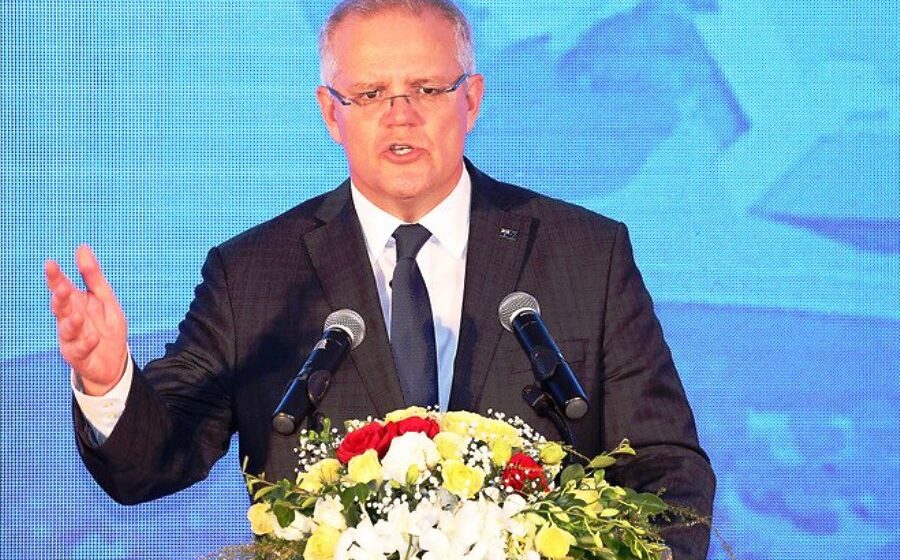Prime Minister Scott Morrison says the leaders of G7 nations have a “strong level of support” for the stand Australia has taken against China as the three-day summit wrapped up in Cornwall.
Speaking shortly before departing for talks with UK officials in London, Mr Morrison said there was increased awareness from European nations about tensions in the Indo-Pacific region and Australia had to be patient to restore its troubled relationship with China.
“What I detected was a significant and increasing awareness of the impact of tensions in the Indo-Pacific for the broader global system, and that in particular relates to Europe,” Mr Morrison said.
“There was a very high level of awareness and a very strong level of support for what has been a very consistent and clear stand that Australia has taken, consistent with our liberal democratic values which are shared by all of those who joined in on the discussions these last few days.”
Throughout the three-day event, their first face-to-face meeting in almost two years, the underlying message of the G7 leaders was about the importance of the world’s democracies uniting as they face the biggest challenges since World War II.
Namely, the pandemic, China’s growing power and climate change.
On an assertive China, Mr Morrison has the G7 nations on side, but there was immediate criticism that the leaders had not gone far enough in tangible action against Beijing.
But, in a sign of the Western economies starting to muscle up against Beijing, China featured in the final communique.
The leaders agreed to call out human rights abuses in Hong Kong and Xinjiang and take action against forced labour practices in the agricultural, solar and garment sectors.
Mr Morrison confirmed he spoke with G7 leaders about the infamous list of 14 grievances against Australia from a Chinese diplomat in Canberra late last year, saying it was no surprise to some of them.
“To have set those out and there is not a country who would sit around that table that would see concession on any of those 14 points as something they also would tolerate,” he said.
“So I think it just set out very clearly that there are differences in world view here, and they may never be able to be resolved.
“But living with China, which is the goal, also requires us to be very clear about what our values are and what our principles are and how our countries are run, free of interference.”
The G7 leaders also called for a full thorough investigation into the origins of COVID-19, which will infuriate China’s President Xi Jinping.
On climate change, the big seven are moving in unison according to the final communique, agreeing to strict measures on coal-fired power stations and promising to move away from coal-fired power plants.
Although, they fell short of setting a timeline to eliminate the use of coal to generate electric power.
They promised to end the international funding for new coal projects without technology to capture and store emissions by the end of this year, with US President Joe Biden revealing the guest nations, including Australia and India, had agreed to work towards that too.
“The G7 is the group that makes decisions about these things, we’re not a signatory to the G7 communique,” Mr Morrison said when questioned about the commitment.
The G7 leaders have renewed their commitment to net zero emissions by 2050 and halving their collective net emissions over two decades by 2030.
In a session on climate change, leaders including Mr Morrison, were told by Sir David Attenborough they were on the verge of humans destabilising the whole planet.
But Mr Morrison said he had not been pressured by any G7 leaders about Australia’s own climate policies.
“Australia, particularly in Asia, has had great success over generations in being one of the primary energy exporters into our region and what I said today is I’m very confident we will be in the new energy economy in the future,” he said.
Mr Morrison will be under pressure to go further than his current desire to achieve net zero “as soon as possible” and “preferably by 2050” ahead of the COP meeting in Glasgow in November.
The Australian PM has now travelled to London where he will hope to strike a free trade deal with the UK in the coming days.
Both nations will want to ensure any deal that is done gives the impression they have come out on top.
There remains differences over tariffs and quotas on agricultural goods and Mr Morrison said it needs to be the right deal for Australia to agree.
The pair will try and resolve the differences at a dinner at Downing Street on Monday evening local time.
Mr Morrison will also meet the Queen at Windsor Castle on Tuesday.



